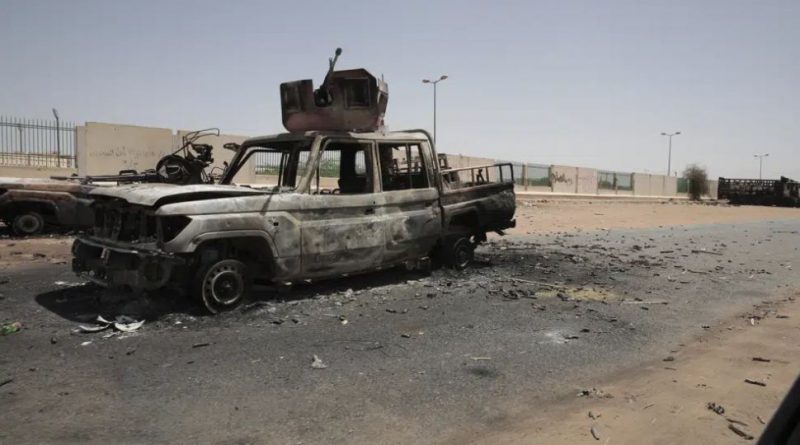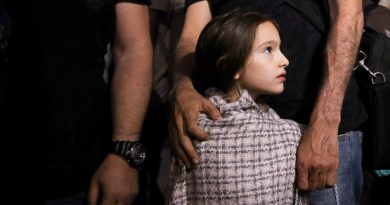Sudan’s top general says military committed to civilian rule
Khartoum (AP) — Sudan’s top general on Friday declared the military’s commitment to a civilian-led government, an apparent bid for international support days after brutal fighting between his forces and a powerful paramilitary group derailed hopes for the country’s democratic transition.
In his first speech since the conflict engulfed Sudan nearly a week ago, army chief Gen. Abdel Fattah Burhan pledged the military would prevail and secure the vast African nation’s “safe transition to civilian rule.” But for many Sudanese, Burhan’s claim rang hollow 18 months after he joined forces with his current rival to seize power in a coup that cast aside Sudan’s pro-democracy forces.
Burhan’s announcement came on the Muslim Eid al-Fitr holiday, which marks the end of Ramadan and its month of fasting. “We are confident that we will overcome this ordeal with our training, wisdom and strength,” Burhan said, vowing to preserve “the security and unity of the state.”
The holiday — typically filled with prayer, celebration and feasting — was a somber one in Sudan, as gunshots rang out across the capital of Khartoum and heavy smoke billowed over the skyline.
“Instead of waking up to the call to prayer, people in Khartoum again woke up to heavy fighting,” said Norway’s ambassador to Sudan, Endre Stiansen. “Can any hell be more horrible than this?”
Mosques held mass morning prayers inside to protect worshippers from the intensified fighting. The violence so far has killed 413 people and wounded 3,551 others, according to the latest toll from the World Health Organization. That includes at least nine children killed and 50 wounded in the fighting, said the United Nations Children’s Fund.
Dallia Abdelmoniem, a 37-year-old baker from Khartoum, fled with her family on Thursday after a rocket sliced through her roof. The road to the city’s outskirts was littered with dead bodies. Abdelmoniem covered the eyes of her nieces and nephews.
“There is no safe place anymore in Khartoum,” she said from her new shelter outside the capital, where she could still hear the howl of artillery and gunfire Friday. “Our number one priority is just to stay alive.”
Heavy gunfire in Sudan after brief ceasefire
Heavy gunfire was heard in the Sudanese capital, Khartoum, as fighting raged between rival forces for the sixth day despite a truce agreement. Meanwhile the U.S. said it will deploy “additional capacities” for possible evacuation and the U.N called for an immediate ceasefire.
The explosions rocking Khartoum followed frenzied international calls for a holiday cease-fire. After the United Nations and U.S. Secretary of State Antony Blinken urged a respite from the spiraling violence, the paramilitary Rapid Support Forces, promised to stop fighting for the three days of Eid al-Fitr to allow for evacuations and safe corridors. But there was no response from Burhan’s military.
Such proposed pauses in the fighting have repeatedly collapsed over the past week.
The two generals vying for control over the vast African nation are also vying for acceptance by foreign powers, which have expressed support for Sudanese seeking a transition to civilian rule. Both Burhan and his rival, RSF chief Mohammed Hamdan Dagalo, have sought to portray themselves as supporters of democracy. In 2019, they turned against long-time autocrat Omar al-Bashir and pushed him out of power amid a popular uprising against his rule.
But since then, they have failed to implement agreements under which they would hand over power. Their forces crushed pro-democracy protests, and in 2021 they jointly carried out a coup that removed a transitional government and entrenched them as Sudan’s most powerful leaders.
The current explosion of violence between them came after Burhan and Dagalo fell out over a recent internationally-brokered deal with democracy activists that was meant to incorporate the RSF into the military and eventually lead to civilian rule.
Since Saturday, the military and RSF have shown no sign of deescalating their fight. The army on Thursday ruled out negotiations with the RSF, saying it would only accept its surrender.
The violence has already pushed Sudan’s population to the brink and opened a dark and tumultuous chapter in the country’s history. Fears are mounting that the chaos in the strategically located nation could draw in its neighbors, including Chad, Egypt and Libya.
The bombardment and sniper fire has hit civilian infrastructure, including hospitals, over the past week. WHO Director-General Tedros Adhanom Ghebreyesus decried what he called the “reprehensible” attacks on health facilities on Friday, saying they “not only jeopardize the lives of healthcare workers but also deprive vulnerable populations of essential medical care.”
The spokesperson for WHO, Margaret Harris, told reporters in Geneva that the violence has forced 20 health facilities nationwide to halt operations. A dozen other hospitals are at risk of shutting down, threatening some 50,000 severely malnourished children in Sudan who are administered regular feeding by tubes to survive, according to UNICEF.
Both the military and RSF have a long history of human rights abuses in Sudan. The RSF was born out of the Janjaweed militias, which were accused of widespread atrocities when the government deployed them to put down a rebellion in Sudan’s western Darfur region in the early 2000s.
“It’s really hard to remain calm,” said Abdelmoniem, describing shortages of fuel, medicine, cash and food causing desperation in much of Khartoum.


